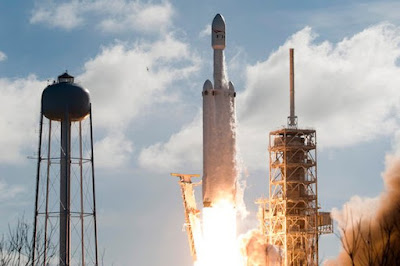 |
| SpaceX's Falcon Heavy rocket lifts off from the Kennedy Space Center, February 6, 2018. Credit: JIM WATSON/AFP/Getty Images |
Topics: Mars, NASA, Space Exploration, Spaceflight
Earlier today, our sun gained a new satellite, courtesy of SpaceX’s first test launch of its Falcon Heavy rocket: A cherry-red Tesla Roadster once driven by SpaceX and Tesla CEO Elon Musk, blasting tunes from David Bowie’s “Space Oddity” with a spacesuit-clad “Star Man” dummy strapped in the driver’s seat. On the dashboard display as it hurtled into the void? “Don’t Panic,” the tagline from Douglas Adams’ Hitchhiker’s Guide to the Galaxy.
Launched with an earth-shaking roar from Pad 39a at NASA’s Kennedy Space Center in Cape Canaveral, Florida—the same launch site of the Apollo 11 lunar mission in 1969 and the first space shuttle flight in 1981—the Roadster was boosted onto an interplanetary trajectory that takes it looping between the orbital vicinities of Earth and of Mars. It is neither the first car nor even the first electric model ever launched into space (the Apollo-era lunar rovers take both of those prizes). But it is certainly the fastest, approaching a speed of 12 kilometers per second relative to Earth when it separated from the Falcon Heavy’s payload fairing en route to deep space.
The big news here, though, isn’t actually the Falcon Heavy’s eccentric payload, but rather the mere fact that this behemoth of a rocket exists and is on the verge of regular operations. Musk, for his part, pegged the chances of success at only 50/50, where “success” was defined as the rocket merely flying high enough to clear the launch pad before exploding. In actuality, the rocket performed nearly flawlessly.
Elon Musk Does it Again, Lee Billings, Scientific American
Comments